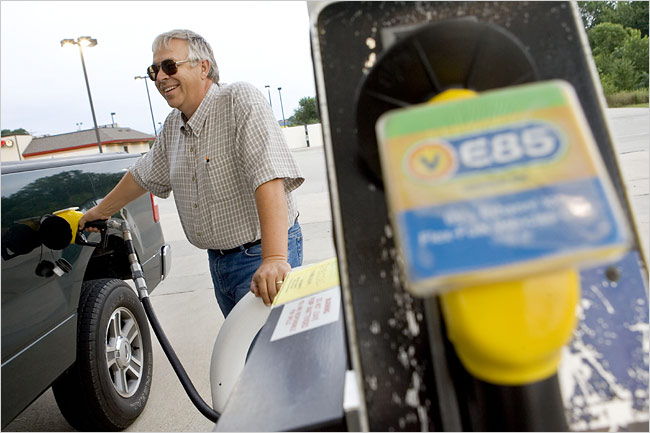As the demand for biofuels increases, so too will food prices around the world. The U.N.’s Food and Agriculture Organization’s recent report notes that “the historic linkages between agriculture and the energy sector are becoming stronger and are changing in character. Biofuel demand will continue to exercise upward pressure on agricultural prices for considerable time to come.” Biofuel production based on agricultural commodities increased more than threefold from 2000 to 2007, and now covers nearly two percent of the world’s consumption of transport fuels.
The question is, at what point are biofuels more trouble than they are worth and what do increased food prices mean for developing nations? According to FAO Director-General Jacques Diouf, “biofuels present both opportunities and risks. The outcome would depend on the specific context of the country and the policies adopted. Current policies tend to favor producers in some developed countries over producers in most developing countries. The challenge is to reduce or manage the risks while sharing the opportunities more widely.” Some of these opportunities include income and employment, if poor small farms can gain access to markets. Giving poor farmers the access and tools that they will need to compete requires investment in infrastructure, research, rural finance, market information and institutions and legal systems. Director Diouf stresses that “decisions about biofuels should take into consideration the food security situation but also the availability of land and water. All efforts should aim at preserving the utmost goal of freeing humanity from the scourge of hunger.”
Candidly, I am torn. I see the benefits of biofuels, but I just can’t shake the feeling that the highest and best use of agricultural land is for production of crops that feed humans, not cars. A step too far in the direction of fuel production may escalate situations not unlike those that we are beginning to face today, where cars are fed in rich nations at the expense of people in developing nations.
What are your thoughts?
Photo Credit: The U.N.’s Food and Agriculture Organization





This is something I’ve been thinking about for awhile and I have to say I agree with you. While I can see the benefits of biofuels and know we need to be working on cleaner energy, I have to think that it is more important and efficient to be using the world’s farmland to grow much needed food.
This is something I’ve been thinking about for awhile and I have to say I agree with you. While I can see the benefits of biofuels and know we need to be working on cleaner energy, I have to think that it is more important and efficient to be using the world’s farmland to grow much needed food.
When food prices were surging last spring, there were riots for food around the world. Food prices were at record highs earlier this year for a number of reasons, but one key driver was the increased use of food for the production of biofuels.
A bright side of the financial and economic crisis is it has stifled demand for a number of commodities, including oil and other fuels. Perhaps the food riots we witnessed last spring will be enough to motivate the next president to revisit the current energy policy. Sadly, the $700b rescue plan will likely force the next president to push back a number of proposed government programs. I hope energy reform is not among these delayed programs. The correct energy policies could create hundreds of thousands of jobs in the alternative energy space. This job creation could provide a substantial stimulus to our suffering economy.
When food prices were surging last spring, there were riots for food around the world. Food prices were at record highs earlier this year for a number of reasons, but one key driver was the increased use of food for the production of biofuels.
A bright side of the financial and economic crisis is it has stifled demand for a number of commodities, including oil and other fuels. Perhaps the food riots we witnessed last spring will be enough to motivate the next president to revisit the current energy policy. Sadly, the $700b rescue plan will likely force the next president to push back a number of proposed government programs. I hope energy reform is not among these delayed programs. The correct energy policies could create hundreds of thousands of jobs in the alternative energy space. This job creation could provide a substantial stimulus to our suffering economy.
I would hope that Energy reform would not be put off either, but if you look at the breakdown of the $750b plan, half of it $350b is to be allocated at the discretion of the next president. I’m not taking sides here (at all) but let’s assume that stats and polls are accurate and Barack Obama wins in Nov. He’s made it clear in the last debate the energy reform is his #1 issue. Assuming there’s no flip flopping, we could see large sums of money going to the R&D energy sector over the course of the next few years.
I would hope that Energy reform would not be put off either, but if you look at the breakdown of the $750b plan, half of it $350b is to be allocated at the discretion of the next president. I’m not taking sides here (at all) but let’s assume that stats and polls are accurate and Barack Obama wins in Nov. He’s made it clear in the last debate the energy reform is his #1 issue. Assuming there’s no flip flopping, we could see large sums of money going to the R&D energy sector over the course of the next few years.
Biofuel is an important development for our future energy needs. Fortunately, there are developments being made that will eliminate the need for using corn and other foodstocks to produce it. The most promising appears to be algae. If that pans out as truly being scalable, it won’t take a lot of subsidy to establish and none to keep going.
Biofuel is an important development for our future energy needs. Fortunately, there are developments being made that will eliminate the need for using corn and other foodstocks to produce it. The most promising appears to be algae. If that pans out as truly being scalable, it won’t take a lot of subsidy to establish and none to keep going.
Hi John Paul:
“Candidly, I am torn. I see the benefits of biofuels, but I just can’t shake the feeling that the highest and best use of agricultural land is for production of crops that feed humans, not cars.”
You might want to have a conversation with some of your Green Options colleagues over at Gas2.org, as they should be able to clear up some of the mystery about food vs. fuel. I have a few quick notes about it to share myself (as a rare guest blogger at Gas2.org as well):
– Domestically, practically zero of our corn product is exported– except for high-fructose corn syrup. Our corn product has never really gone into the mouths of the third world.
– In 2000, 80% of our corn product went to chicken/cattle feed. The remainder went to corn syrup, biofuel, produce and to grocery manufacturers who make corn-related foods, chips, etc.
– The biofuel use of corn has increased, but that has almost entirely taken away from chicken/cattle crops, only a marginal squeeze on the latter.
Point being, domestic corn ethanol doesn’t have a meaningful impact on crops that feed humans in our country.
—
Note that in driving the price of feed up, it has put a squeeze on the conglomerates who produce chicken, like Pilgrim’s Pride. The same Pilgrim’s Pride whose CEO, Bo Pilgrim, donated $100,000+ to Texas Governor Rick Perry’s campaign for governor, who immediately asked the EPA to repeal the government’s ethanol mandate. No one in our country is starving from corn ethanol– just the grocery manufacturers who are worried about their bottom line and perpetuating the food vs. fuel myth.
Hi John Paul:
“Candidly, I am torn. I see the benefits of biofuels, but I just can’t shake the feeling that the highest and best use of agricultural land is for production of crops that feed humans, not cars.”
You might want to have a conversation with some of your Green Options colleagues over at Gas2.org, as they should be able to clear up some of the mystery about food vs. fuel. I have a few quick notes about it to share myself (as a rare guest blogger at Gas2.org as well):
– Domestically, practically zero of our corn product is exported– except for high-fructose corn syrup. Our corn product has never really gone into the mouths of the third world.
– In 2000, 80% of our corn product went to chicken/cattle feed. The remainder went to corn syrup, biofuel, produce and to grocery manufacturers who make corn-related foods, chips, etc.
– The biofuel use of corn has increased, but that has almost entirely taken away from chicken/cattle crops, only a marginal squeeze on the latter.
Point being, domestic corn ethanol doesn’t have a meaningful impact on crops that feed humans in our country.
—
Note that in driving the price of feed up, it has put a squeeze on the conglomerates who produce chicken, like Pilgrim’s Pride. The same Pilgrim’s Pride whose CEO, Bo Pilgrim, donated $100,000+ to Texas Governor Rick Perry’s campaign for governor, who immediately asked the EPA to repeal the government’s ethanol mandate. No one in our country is starving from corn ethanol– just the grocery manufacturers who are worried about their bottom line and perpetuating the food vs. fuel myth.
http://cleantechnica.com/2008/10/20/alternative-fuels-could-deplete-water-supplies/
http://cleantechnica.com/2008/10/20/alternative-fuels-could-deplete-water-supplies/
http://online.wsj.com/article/SB122636711059015989.html?mod=article-outset-box
http://online.wsj.com/article/SB122636711059015989.html?mod=article-outset-box
Very nice job on this website. Loving it rofl.
Subscribed! 🙂
Very nice job on this website. Loving it rofl.
Subscribed! 🙂